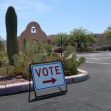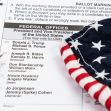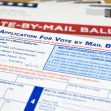Hiding behind the myths of voter fraud and stolen elections, 27 states have introduced over 250 bills this year that pose new challenges to the right to vote, especially for people of color. These efforts come on the tail of the 19 discriminatory voting rights bills that passed in 33 states in 2021. But many are fighting back. As of January 14, legislators in at least 32 of them have introduced 333 bills to expand the right to participate in voting -- the most fundamental tenet of democracy.
According to the Brennan Center for Justice, an independent, nonpartisan law and policy organization based in New York and Washington, D.C., the restrictive laws fall into several standard categories. The information below is organized by type of restriction and lists many of the states that are currently considering a form of the described law.
- Access to Mail-In Voting: Although the specific requirements vary from state to state, most of the bills that seek to restrict mail-in voting share onerous characteristics such as requiring applicants to show driver's licenses or Social Security cards.
Bills with this purpose have been introduced in Maryland, Virginia and Missouri. Mississippi and South Carolina would also shorten the length of time permitted for absentee ballots.
Another way to curtail mail-in voting is to prohibit state governments from sending out unsolicited absentee ballots. Those who want to vote by mail must request a ballot. Bills to this effect have been proposed in Arizona, Missouri, New Hampshire and New Jersey. The Missouri bill carries criminal penalties for legislators who disobey.
In addition, bills in 13 states seek to limit who can even vote by mail. A Mississippi bill would ban students who are not in the same county as they were when they registered, Missouri would require caregivers to live in the same place as the person whose ballot they are assisting, and Virginia would entirely ban absentee voting.
Other ploys in Missouri, New Jersey and Washington allow monitors to reject a ballot if “the signature does not appear to be valid.” This appears to be vague on its face.
- Restricting the Number and Location of Drop Boxes: Many states propose the elimination or required monitoring of boxes. Others also impose the need for persons dropping off ballots to show personal identification as well as identification of the person who voted. The violation of this new law would be a felony. Arizona and Virginia legislatures are considering such bills, while another Arizona bill gives an exception for caregivers.
- Stricter Voter Identification: Bills in eight states, including Missouri and Virginia, seek to eliminate previously acceptable forms of identification, such as bank statements. Virginia wants to require photos on college identification cards and wants all those who register to present photo IDs. Missouri and New Hampshire would eliminate affidavits attesting to a person’s identification and, in Arizona, driver’s licenses would no longer work. It wants proof, such as fingerprints or signatures. North Carolina already does not accept public assistance or state employee ID cards, which are popular forms of identification for Black voters.
The American Civil Liberties Union (ACLU) reports that 21 million Americans or 11% of the entire population lack any form of government-issued identification. The costs of obtaining acceptable documents are high, with estimates ranging from $75 to $175. There can also be long waiting times.
- New Demands for Persons with Disabilities: A Virginia bill would repeal a state law that facilitates voting assistance to the disabled, while another would require annual renewal. Washington State wants to change a law that requires voting assistance for the blind.
- Demands on New Proof of Citizenship: Washington State has seen proposals that require auditors to cancel the registration of anyone who has not shown proof of citizenship. Arizona and Virginia also have new requirements.
While all of the above are burdensome and onerous, 32 other states have introduced bills to eliminate many of these barriers to access. There are also many legal challenges to gerrymandered redistricting maps that diminish the power of minority communities. The Supreme Court, however, scuttled Wisconsin’s attempt to redistrict in a way that added one Black-majority assembly district in March.
If successful, how could these restrictions affect future elections? They can lower turn-out by two-to-three percentage points according to the Government Accounting Office. They will decrease participation by Black voters, as an estimated 25% of them would lack acceptable ID. In addition, a CalTech/MIT study found that many current laws are enforced in discriminatory ways. For example, Black voters are asked for ID more frequently than white voters.
But there is some positive news because in late March, a federal judge struck down a discriminatory Florida law that imposed 33 new restrictions on voters. In addition, on March 18, a Circuit Court Judge in Arkansas issued a permanent injunction against four laws involving voter identification, regulating campaigning near voting places, validating ballots and setting reduced deadlines for absentee ballots. "In the judicial sphere you don't prove something is illegal just because you're afraid something might happen," the judge said. "That's speculation."
Many believe the states cannot be trusted to protect the voting rights of all Americans. President Biden issued an executive order in March 2021 that directed federal agencies to “conduct effective voter registration.” But Congress has passed neither the John Lewis Freedom to Vote Act nor any other meaningful legislation thus far. With midterm elections only seven months away, it is surely time to step up efforts that protect the most sacred and necessary right of all Americans.






